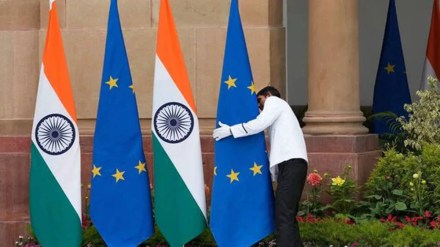The European Union has agreed to adjust the carbon price paid by exporters in India from their due payments under the Carbon Border Adjustment Mechanism (CBAM) and simplify rules on the carbon tax for small business.
This was stated in the new Strategic EU-India Agenda adopted by the 27-member bloc on Wednesday.
“A carbon price effectively paid in India will be deducted under the CBAM financial adjustment, which, being based on carbon content, will favour Indian exporters decarbonising their CBAM goods. This mechanism is also being simplified to benefit small businesses,” the EU said in a communication to the European Parliament.
EU to implement CBAM tax from January 2026
Effective January, 2026, the EU will start collecting tax under CBAM which will be equal to the price of excess carbon emitted during the production stage of select products like iron and steel, aluminium, cement, electricity, hydrogen and fertilisers. The EU has prescribed a threshold of carbon emission on each product beyond which this tax will be imposed.
India’s Carbon Credit Trading Scheme is advancing rapidly, and the EU can share lessons from its Emissions Trading Scheme on monitoring, reporting, verification and sectoral benchmarks, the communication said. This move will enable India to collect a part of the carbon tax that will be payable to the EU locally.
The initiative for the agenda was announced by EU President Ursula von der Leyen in her political guidelines for 2024-29 to better coordinate bilateral cooperation and help tackle major global challenges.
The EU President also had a telephonic conversation with Prime Minister Narendra Modi. During the talk, Modi conveyed appreciation for the adoption of the agenda. Both leaders also reaffirmed their commitment for the conclusion of the India-EU FTA by the end of the year.
This new agenda also has an element of skills mobility with the pilot European Legal Gateway Office to facilitate labour mobility. It proposes developing a comprehensive mobility cooperation framework covering study, work, and research.
Another focus of it is reinforcing supply chains while promoting critical emerging technologies and engagement on digital issues, with particular attention to strengthening economic security within the Trade and Technology Council (TTC).
EU-India startup partnership
This new strategy also proposes deepening tech cooperation, including a potential EU-India startup partnership, and invites India to associate with Horizon Europe programme.
It suggests ambitious initiatives for decarbonisation and the clean transition, such as intensifying cooperation on renewables, developing green hydrogen capabilities and expanding green finance. Strengthening food security and health, climate and disaster resilience are other items on the agenda apart from security and defence.
The agenda also emphasises strengthening regional connectivity initiatives, such as the India-Middle East-Europe Economic Corridor (IMEC) and advances Global Gateway and EU-India trilateral cooperation with and in third countries. It aims to enhance cooperation with India in multilateral forums.
